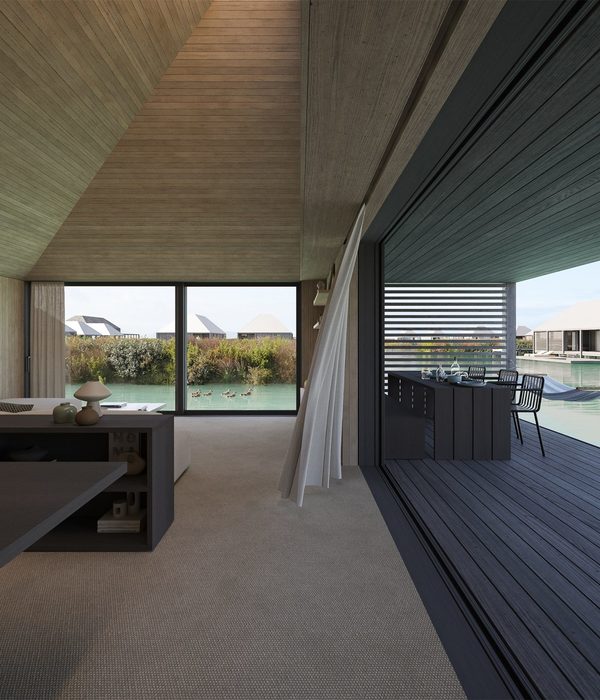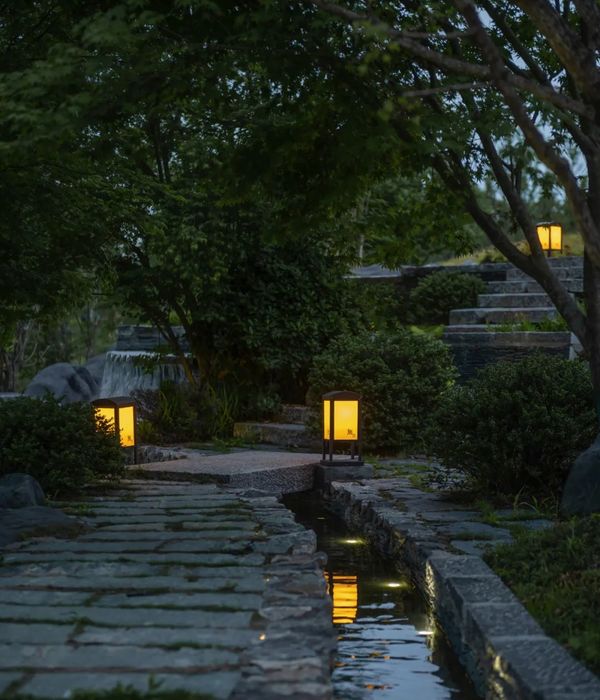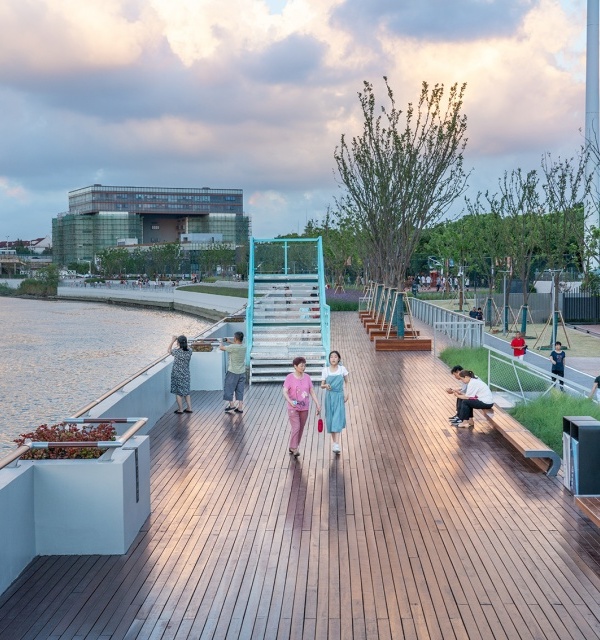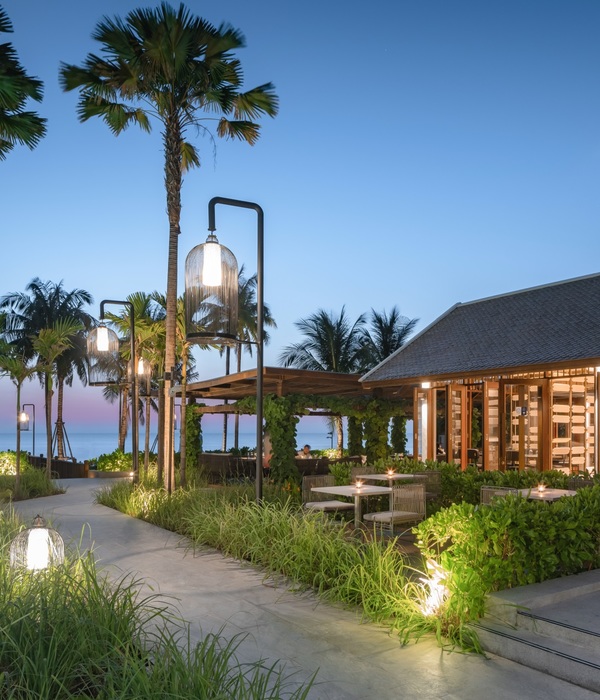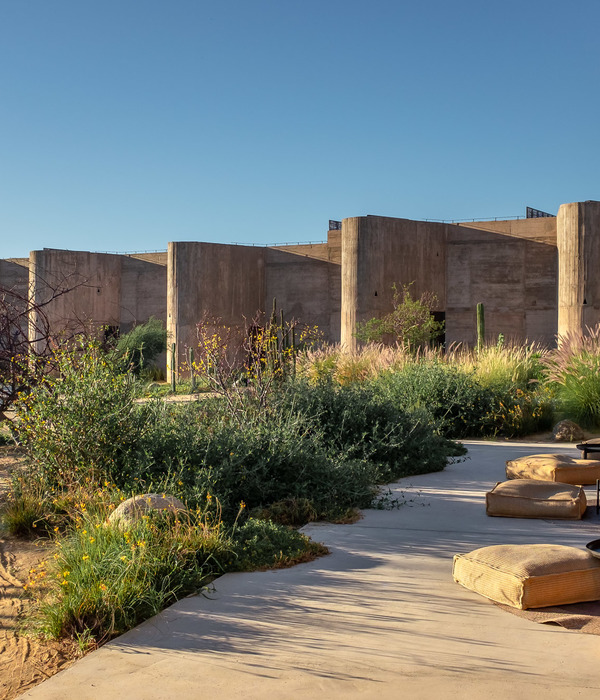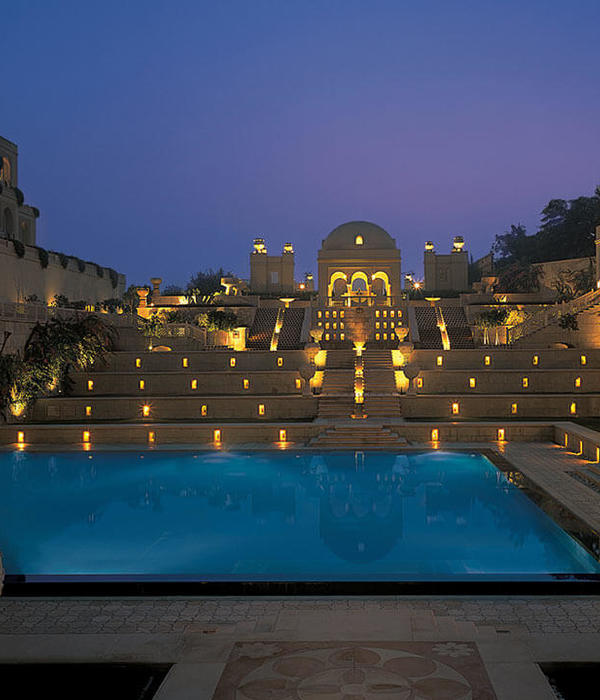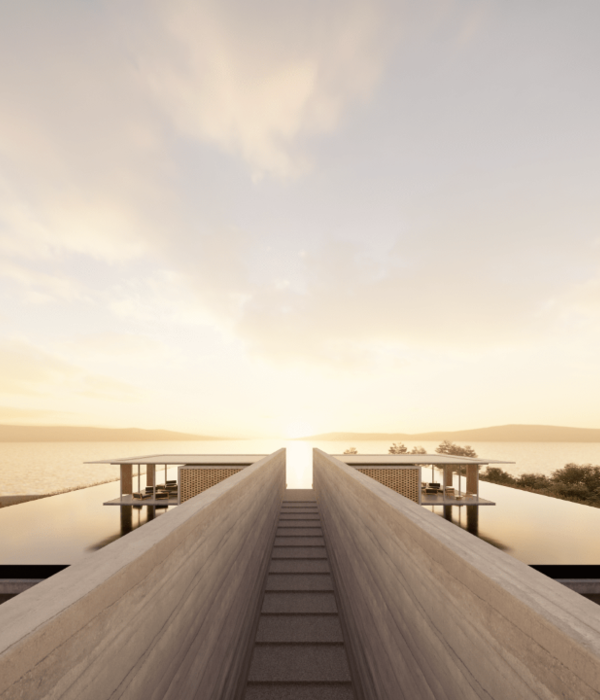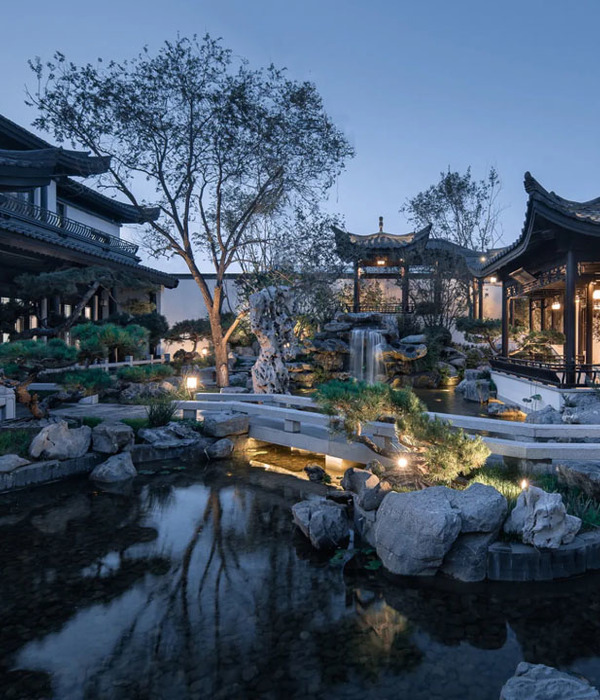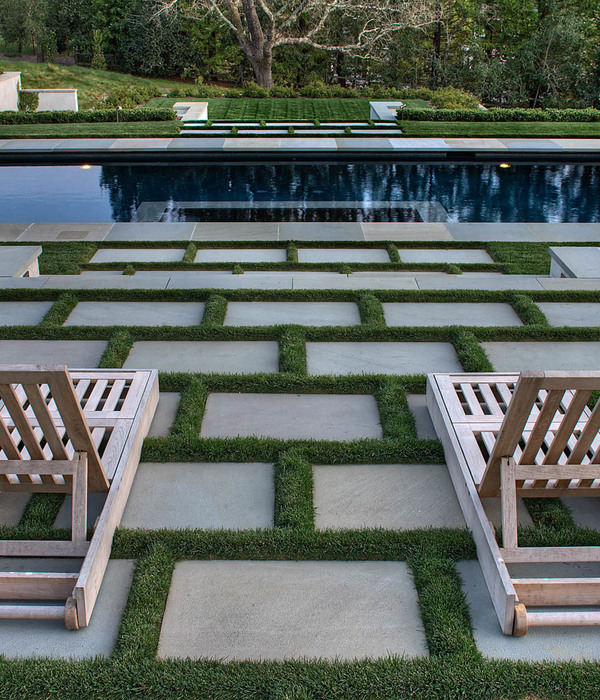- 项目名称:新城琅翠
- 客户:重庆新城
- 完成年份:2019
- 项目地点:重庆江北区海尔路
- 景观设计:重庆道合园林景观规划设计有限公司
- 设计团队:邓仁俊,侯宗廷,陈渝,叶浩,王验,张渝,张雪,张璐,胡朋
- 设计部门:道合设计一所,成都三所
- 建筑设计:乔恩建筑
- 施工单位:重庆大墅园林
- 摄影:道合摄影-高代明,日野摄影
道合设计:每一次设计,都是一次新的探索,当我们面对这块场地时永不知道,有什么会从那里生长出来,这正是设计的冒险和乐趣。项目位于重庆江北区海尔路,紧临长江边,重庆四大天然公园之一的铁山坪森林公园入口。山与水就是这块场地独特烙印。我们应该保留什么,创造什么,如何塑造和景观对话的空间?如何将建筑、景观标识设计等语言多维合一? 所有这些问题一直徘徊在整个的创作过程中。
DONEHOME:Every design is a new exploration. When facing this site, we never know what will be created.This is exactly the adventure and fun of design.The project is located on Haier Road, Jiangbei District, Chongqing, next to the Yangtze River and the entrance of Tieshanping Forest Park, one of the four natural parks in Chongqing. Mountains and water are the unique marks of this site.What should we keep, what to create, and how to shape the space for dialogues with the landscape?How to multi-dimensionally integrate architecture, landscape logo design, and other languages?All these issues have been hovering throughout the creative process.
乔治·布拉克(Georges Braque)立体主义(Cubism)的空间探索与霍克尼拼贴艺术的启示
Georges Braque-Cubism Space Exploration,Thinking about Hockney’s collage art
在思想碰撞中,我们想到了乔治·布拉克(Georges Braque)—立体主义(Cubism)的鼻祖。立体主义(Cubism)作为西方现代艺术史上的一个运动和流派,1908年始于法国。立体主义的艺术家追求碎裂、解析、重新组合的形式,形成分离的画面,以许多组合的碎片形态为艺术家们所要展现的目标。
“拼贴艺术”自其起源到发展,在人类认识世界过程中有着很重要的价值。本文试图从图像的时空联系,展开对”霍克尼式”拼贴艺术的研究,从而揭示后现代主义一种新的艺术视觉和新的感受方式、观察方式及思考方式。
拼贴艺术和对空间表达的探索成为创意灵感的源泉,我们脱离对客观外物的再现与描摹,穿越于对象、空间与时间中的多维法则。以铁山坪的山脉为灵感,融入重庆民居屋顶的元素,以“山” 水” 林”为主题,在三维形式的解体、重构、抽离上,通过简单的几何形状,元素延展、渗透,保持其空间关系,去寻找时空的联系和项目自身的烙印。
同时,我们抽取山之“势”,水之“理”,在尊重场所精神,洞悉居者所需基础上,以飞鹭寻林:林引、林迎、望林、入林、戏林、归林的故事脉络。通过现代手法演绎,在山水秘境中探寻人们内心的“重庆森林”。让景观是建筑的延伸,建筑是景观的融合。
In the collision of thoughts, we thought of Georges Braque, the originator of Cubism. Cubism, as a movement and genre in the history of western modern art, began in France in 1908. Cubist artists pursue the fragmentation, analysis, and recombination of forms to generate separate pictures, with many combined fragments as the goal for artists to show.
“Collage art” has a very important value in the process of human understanding of the world from its origin to development. This article attempts to explore the “Hockney-style” collage art from the spatial and temporal connection of images, to reveal a new artistic vision and new ways of feeling, observation, and thinking of postmodernism.
Collage art and exploration of spatial expression have become a source of creative inspiration. We take away from the representation and description of objective objects and penetrate the multidimensional laws of objects, space and time. Inspired by the mountains of Tieshanping, the elements of the roofs of Chongqing’s residential buildings are integrated, and the theme of “mountain”, “water” and “forest” is used to disintegrate, reconstruct, and extract in three dimensions. Through simple geometric shapes, the elements are penetrated and extended, maintaining its spatial relationship and looking for the connection of time and space and the brand of the project.
At the same time, we extract the “potential” of the mountains and the “flow” of the water. Respecting the spirit of the place and understanding the needs of the residents, we use the flying heron to find the forest: Lin Yin (Introduce), Lin Ying (Welcome), Wang Lin (Expect), Ru Lin (Entry), Xi Lin (Enjoy), Guilin (Return). Through modern interpretation, we explore the “Chongqing Forest” in people’s hearts in the secret landscape of mountains and rivers. Let landscape be an extension of architecture, and architecture be a fusion of landscape.
重组的空间秩序 Reorganized spatial order
在空间秩序上,我们以山峦、星辰雕塑的单位元去做出多重组构与空间延展。它们散落在蜿蜒曲折的水边,阶梯上、草坪中…..在上下左右的多元向度里,拉出立体层次感。在自由变幻化中,呈现出表情丰富的律动空间。
For spatial order, we use the unit elements of mountains and stars to make multiple reconstructions and space extensions. They are spread on the side of the winding water, on the steps, on the lawn ….. In the multi-dimensionality of the upper, lower, left and right sides, the three-dimensional layering is drawn. In the free change, a rhythmic space with rich expression is presented.
折线、斜线的单位元在曲折延伸中切割出一个个三角形立体的花园,互相依赖、互相构成,但又独具一格。
The unit elements of the polyline and the oblique line cut out the triangle-shaped three-dimensional gardens in the zigzag extension, which depend on each other and constitute each other with uniqueness.
拾级而上,徜徉于三角形立体花园中,体验空间的变幻和力量。我们最大限度的将自然之美、地域文化、设计之艺与人文关怀相结合,于一花一木、一景一筑、一石一水之中,赋予人与场地、人与人的关系更多可能性。
Step up and wander into the triangular three-dimensional garden to experience the change and power of the space. We maximize the combination of the beauty of nature, regional culture, the art of design and humanistic care, and in every part of the landscape, we can make the relationship between people and places more possibilities.
多元的空间融合 Multiple spatial fusion
光线、空气、温度、文艺、人……融合在直线、曲线、折线所构成的轮廓、块面里堆积出交错的趣味和情调。
每当来到一个陌生场地,我们总能读取到空间里包藏的某些气质。从踏勘现场,到执笔展开设计与落地,新城琅翠的思考与创作是道合在设计上一次“打破、重塑、拼贴”的时空探索。我们以谦逊的态度面对场地、人与自然空间的关系,立足于景观与建筑的融合性,将要素进行分解,用新的方式进行组合、拼贴,并以多维度的语言,演绎出生活的诗和远方。不一样的生活理想与向往,自然形成了不同的空间。新城琅翠满足了人们对于隐于城市的风景里的向往,在不乏温度与厚度的人文气质中,延展了场所精神和生命力。
Light, air, temperature, art, people… Integrate into frames and blocks composed of straight lines, curves, and polylines, creating overlaid fun and mood.
Whenever we enter a new site, we always can read the characteristics form the space. From surveying the site to writing and launching the design and construction, the thinking and creation of the new city Langcui is a breakthrough in design. We treat the relationship between people and the natural space of the site with a humble attitude. Based on the integration of landscape and architecture, we decompose, combine and collaged the elements in new ways. Also, we use a multi-dimensional language to present poetry and distance of life.Different life ideals and longings naturally form different spaces. The new city Langcui satisfies people’s yearning for the scenery hidden in the city and extends the spirit and vitality of the place in the humane temperament of temperature and thickness.
项目名称:新城琅翠
客户:重庆新城
完成年份: 2019
项目面积:5000㎡
项目地点:重庆江北区海尔路
景观设计:重庆道合园林景观规划设计有限公司
设计团队: 邓仁俊,侯宗廷,陈渝,叶浩,王验,张渝,张雪,张璐,胡朋
设计部门: 道合设计一所,成都三所
建筑设计:乔恩建筑
施工单位:重庆大墅园林
摄影: 道合摄影-高代明,日野摄影
Project Name:XinCheng LangCui
Customer:FUTURE LAND
Year of completion: 2019
Project area: 5000㎡
Project location:chongqing, China
Landscape Design:DONEHOME
Design team: deng renjun, hou zongting, Chen yu, ye hao, wang jian, zhang yu, zhang xue, zhang lu, hu peng
Photography:DONEHOME – Gao Daiming, riye photography
{{item.text_origin}}



